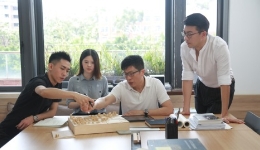Original title: Beware of Infringement by Case "Viewing" Law! Avoid these risks when generating content with AI
Xinhua Beijing, May 23 (Reporter Lu Junyu) On May 15, the first "AI audio-visual works infringement case" was held. Previously, on April 23, the Beijing Internet Court sentenced the first case of AI voice infringement in China, and the plaintiff won because its voice was imitated and commercially used by AI technology; In January, China's first case of copyright infringement of AI generated pictures came into effect. After five trials of the case, the court finally found that the plaintiff's pictures were "original", in line with the definition of works, belonging to art works and protected by copyright law.

The birth of generative AI has provided great convenience for human society, but its generation and application process are also accompanied by many risks, especially tort risk. Therefore, in order to better understand China's legislation on risk prevention of generative AI and the types of infringement, and promote us to effectively regulate our own behavior and correctly use AI, the reporter interviewed Tang Qinglin, a researcher of the International Intellectual Property Research Center of Peking University and director of Beijing Yunting Law Office.
Xinhua: What are the specific provisions of China's current laws and regulations and other departmental rules on regulating the application of generative AI?

Tang Qinglin: On August 15, 2023, the Interim Measures for the Management of Generative AI Services was issued, which is a special provision for generative AI. The Interim Measures put forward basic requirements for providers and users to follow social morality and ethics, including adhering to socialist core values and protecting business secrets, personal privacy, etc; At the same time, it further standardized generative AI services from specific aspects such as service specifications and legal responsibilities.
For the development and standardization of artificial intelligence, China issued the Notice of the State Council on Printing and Distributing the Development Plan of the New Generation of Artificial Intelligence as early as 2017, taking artificial intelligence as a strategic goal and achieving it in three steps. At the same time, it is proposed to establish an AI security supervision and evaluation system, and increase the punishment for data abuse, invasion of personal privacy, violation of ethics and other behaviors.
The Guiding Opinions on Strengthening the Comprehensive Governance of Internet Information Service Algorithms promulgated and implemented in 2021 and the Administrative Provisions on Internet Information Service Algorithm Recommendation implemented in 2022 both specify the normative requirements for information services, and algorithm recommendation service providers shall not use algorithm recommendation services to infringe the legitimate rights and interests of others.
In addition, there is the Regulations on the Management of Deep Synthesis of Internet Information Services, which mainly stipulates that deep synthesis service providers must ensure data security when conducting training data management, and at the same time, they should conduct security assessment on information that may involve national security, personal privacy, etc., and review the input data and synthesis results of users of deep synthesis services in a technical or manual manner.
Xinhua: Are the works formed by generative AI original and protected by copyright law?

Tang Qinglin: In judicial practice, from the perspective of judges, "originality" requires that the work be completed by the author independently, and reflects the author's personalized expression. Therefore, if a work is only mechanically completed in a certain order, formula or structure, different people will get the same result, which is usually considered not original.
Whether the works formed by generative AI are original cannot be generalized. Under a certain data model, the more detailed and specific the user's prompt words are, the greater the difference between the results of AI generated works and those presented by others, and it can also be considered that their works are more likely to be original.
Creative works should be protected. However, since the subject of copyright ownership in China's copyright law does not include AI models, it is still controversial whether the AI model itself can become the subject of copyright law protection. In the current judicial practice, the user of generative artificial intelligence usually requests the court to protect the copyright.
Xinhuanet: What legal risks may arise from the rapid development of generative artificial intelligence?

Tang Qinglin: The legal risks that generative AI may cause are both extensive and complex, and the infringements in civil law are mainly manifested in several aspects:
Infringement of others' information and privacy. The generative AI service provider needs to collect a large amount of data and conduct data training to form a model in the early stage. In the process of data collection, the service provider may collect, store and use the information of others without their consent, which may involve highly sensitive information or personal privacy, At this time, the service provider may have violated the personal information or privacy rights of others.
Infringement of others' right of name, portrait and reputation. For example, among the typical cases of infringement of the right of personality published by the Supreme Law, there is one case where artificial intelligence software uses the image of a natural person to create virtual characters without authorization, which constitutes infringement. The defendant, as the operator of artificial intelligence, allowed users to add AI companions on their own in the software. Without the consent of the plaintiff, the software used the plaintiff's name, portrait and other information, so that it was identified as "AI companion", and opened the role to many other users. Finally, the Beijing Internet Court ruled that the defendant infringed the plaintiff's right of name and portrait.
Generative AI is also relatively easy to cause intellectual property infringement disputes. For example, if there are copyrighted works of others in the data, and the service provider uses these works without authorization of others, the copyright of others may be infringed. Similarly, such AI generated works may also be based on the use of other people's trademarks, which may lead to some confusion among consumers when promoting products using generated pictures, and may also constitute infringement of trademark rights.
Xinhuanet: What aspects should people pay attention to when using generative AI for entertainment and social interaction in daily life?
Tang Qinglin: First, when using AI, we need to pay attention to the protection of personal information security and personal privacy. According to the provisions of the Personal Information Protection Law, the individual consent of the user shall be obtained for providing personal information to others or disclosing personal information to the public. Because when users use generative AI, they need to provide data to the machine, such as asking questions or giving prompt words, and these data themselves may be used for AI training. In the process of data training for service providers, it is very possible to capture personal undisclosed information, even highly sensitive information and personal privacy, and use these captured information as training data. At this time, it is very easy to cause disclosure of personal information and privacy, causing unnecessary losses to individuals.
Secondly, try to ensure the authenticity and accuracy of the input information. Because AI products can not distinguish the authenticity of information yet, they can only complete the output of text, pictures and videos according to the input information and instructions, so AI is easy to treat false and incorrect information as facts, resulting in errors in generating content or confusion for users.
Thirdly, users should also pay attention to the protection of human dignity, personal information and other legitimate rights and interests of others. If they find that generative AI services do not comply with laws and administrative regulations in the process of using AI, users have the right to complain and report to relevant competent authorities.
Finally, we should pay close attention to the limits of the use of artificial intelligence by minors. The Interim Measures for the Management of Generative AI Services specifically stipulates that service providers should take effective measures to prevent minor users from excessively relying on or indulging in generative AI services. The excessive use of generative AI by minors is more likely to lead to the problem of minors' personal information and privacy being captured and illegally used, and may also easily lead to minors being misled by false information generated by AI, which will have a negative impact on minors' thoughts and cognition.






















